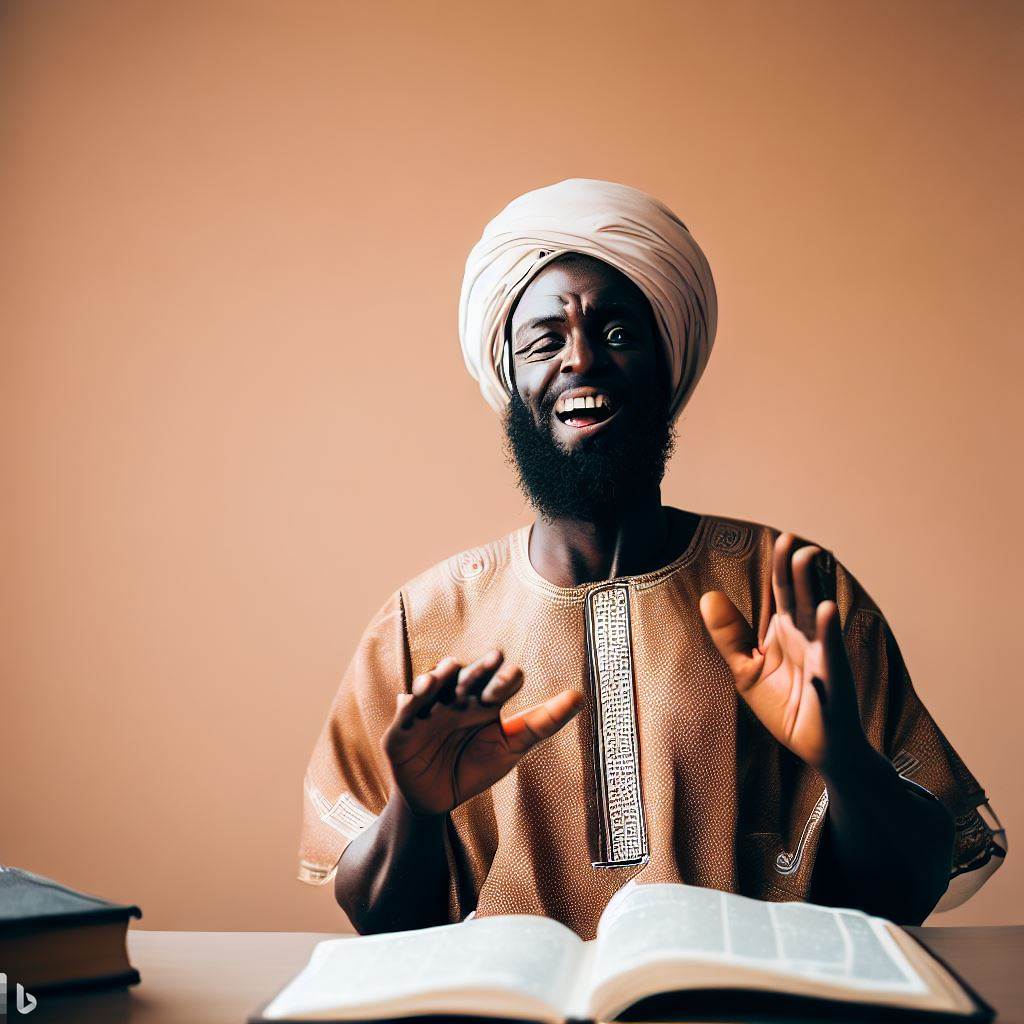Introduction
Writing in Nigeria is much more than penning words on paper. It is a reflection of the nation’s rich cultural heritage, diverse people, and complex history.
From Chinua Achebe’s “Things Fall Apart” to Chimamanda Ngozi Adichie’s “Half of a Yellow Sun,” Nigerian literature has gained global recognition and shaped the literary landscape.
Embarking on the path to becoming a writer in Nigeria is not an easy one. It requires passion, resilience, and a firm belief in the power of words.
Aspiring writers often face numerous challenges, from limited access to literary resources to societal expectations that prioritize traditional professions over creative pursuits.
However, the digital age has opened up new avenues for Nigerian writers. The internet provides a platform for self-publishing, blogging, and connecting with a global audience.
Social media platforms like Twitter have become virtual writing communities, allowing writers to share their work, receive feedback, and build networks.
Moreover, literary festivals and writing workshops have emerged across Nigeria, offering aspiring writers the opportunity to learn from established authors, hone their craft, and connect with like-minded individuals.
Organizations such as the Association of Nigerian Authors also play a crucial role in supporting and promoting the Nigerian literary scene.
In the end, the journey to becoming a writer in Nigeria is a winding road filled with challenges and opportunities.
Through dedication, perseverance, and the support of a vibrant literary community, aspiring Nigerian writers can strive to make their mark on the world stage. So, are you ready to embark on this captivating journey?
The Desire to Write
A. The love for storytelling: The long-standing tradition of storytelling in Nigerian culture
Storytelling has been an integral part of Nigerian culture for centuries, serving as a means to pass down traditions, history, and moral values.
It is deeply rooted in the fabric of society, connecting people through the power of words.
From ancient tribes to modern-day communities, storytelling has played a significant role in preserving cultural heritage.
Griots, skilled oral storytellers, were highly respected members of society, using their talent to entertain, educate, and inspire.
Nigerian folklore, myths, and legends have captivated audiences for generations. These tales are filled with vibrant characters, supernatural elements, and valuable life lessons.
They transport listeners to a world of imagination, creating a shared experience that unites communities and fosters a sense of belonging.
Furthermore, storytelling extends beyond verbal communication in Nigeria. The art of storytelling is celebrated in various forms such as dance, music, theater, and literature.
It is a universal language that transcends barriers, encapsulating the beauty and diversity of Nigerian culture.
B. Influence of literature: The impact of Nigerian literature on aspiring writers
Nigerian literature has been a source of inspiration and guidance for aspiring writers across the country.
The works of renowned Nigerian authors have gained international recognition, paving the way for a new generation of literary enthusiasts.
The Nigerian literary scene burst onto the global stage with writers like Chinua Achebe, Wole Soyinka, and Chimamanda Ngozi Adichie, who have showcased the richness of Nigerian storytelling through their novels, plays, and essays.
Their success has shattered stereotypes and ignited a passion for writing among Nigerians.
These literary giants have not only left a lasting impact on the literary world but have also paved the way for aspiring writers to explore different genres and perspectives.
Nigerian literature encompasses a wide range of themes, from identity and colonialism to politics and social issues, resonating with writers looking to create meaningful and thought-provoking work.
Aspiring writers in Nigeria now have access to writing workshops, literary festivals, and online communities that provide resources and opportunities for growth.
They look up to their literary heroes as living proof that their stories are worth telling and that their voices can be heard.
C Personal motivation: Personal experiences or stories from established Nigerian writers that inspire others to write
Established Nigerian writers serve as beacons of inspiration for those on their writing journey.
Their experiences and stories offer valuable insights, encouragement, and the belief that becoming a writer in Nigeria is not only possible but also rewarding.
Acclaimed Nigerian author, Chimamanda Ngozi Adichie, shared her early struggles and determination to pursue her passion for writing.
She faced skepticism and doubts but remained steadfast in her commitment to her craft. Her success story motivates aspiring writers to persevere in the face of adversity and rejection.
Chinua Achebe, often referred to as the father of modern African literature, overcame numerous obstacles to become a celebrated author.
His groundbreaking novel, “Things Fall Apart,” broke the mold and showcased the power of storytelling as a vehicle for cultural representation and exploration.
These narratives of resilience and creative persistence resonate with aspiring writers, urging them to embrace their unique perspectives and push boundaries.
They instill a sense of confidence and fuel the desire to contribute their own stories to the rich tapestry of Nigerian literature.
In fact, the desire to write in Nigeria is deeply rooted in the love for storytelling, the influence of Nigerian literature, and personal motivation drawn from the experiences of established Nigerian writers.
The tradition of storytelling, the impact of literary giants, and the stories of success against all odds inspire and propel aspiring Nigerian writers on their journey to becoming storytellers themselves.
Read: Importance of Cultural Knowledge for Translators in Nigeria
Challenges Faced by Writers in Nigeria
When examining the journey to becoming a writer in Nigeria, it is crucial to acknowledge the numerous challenges that writers face within the country.
These hurdles, often unique to Nigeria’s socio-economic and cultural context, can significantly impact a writer’s development and success.
A. Limited resources
One significant challenge for Nigerian writers is the limited access to good libraries, writing workshops, and writing programs.
The scarcity of well-equipped libraries hampers writers’ research abilities and the breadth of knowledge they can acquire.
Without access to a wide range of literature, Nigerian writers may struggle to develop their unique writing styles and expand their perspectives.
Furthermore, the lack of writing workshops and programs creates a barrier for aspiring writers who are seeking opportunities to improve their craft.
These workshops provide valuable guidance, feedback, and networking opportunities, essential for growth and skill refinement.
However, the scarcity of such workshops makes it difficult for Nigerian writers to access these resources, hindering their development and potential success.
B. Socio-economic factors
Poverty and economic instability pose significant challenges for writers in Nigeria.
Many aspiring writers face financial difficulties, struggling to afford basic necessities, let alone dedicate time and resources to their writing.
The burden of poverty diverts their attention and energy away from their creative pursuits, hindering their ability to focus on writing and cultivate their talent.
Additionally, economic instability can lead to inconsistent income streams for writers. Unpredictable financial conditions make it challenging for writers to sustain a stable writing career.
The constant worry about financial stability distracts them from their creative processes and can inhibit their ability to produce quality work consistently.
C. Cultural barriers
Cultural beliefs and practices in Nigeria can discourage writing as a viable career choice.
Traditional norms often prioritize more “practical” careers, such as medicine, law, or engineering, as they are perceived to offer greater financial stability and societal recognition.
This cultural mindset places writing in a secondary position, relegating it to a mere hobby rather than a legitimate profession.
Furthermore, cultural practices can also discourage young writers from pursuing their literary passions. The expectations of conformity and adherence to cultural norms often limit individual expression and creativity.
Young writers may encounter resistance from their families or communities when they choose to pursue writing, as it is not perceived as a respectable or secure career path.
In a nutshell, Nigerian writers face various challenges on their journey to becoming successful authors.
Limited access to resources such as good libraries, writing workshops, and programs hinders their opportunities for research and skill development.
Socio-economic factors like poverty and economic instability pose financial obstacles that distract writers from their craft.
Cultural barriers discourage writing as a viable career choice, emphasizing more traditional career paths.
Despite these challenges, Nigerian writers continue to defy the odds, demonstrating their resilience and determination to make their mark in the literary world.
Read: Advancements in the Field of Interpretation in Nigeria
Nurturing Writing Skills
A. Education
Formal education and literature courses play a vital role in shaping aspiring writers.
These programs provide the necessary foundation and structure to develop writing skills.
By studying literature, writers gain insights into different writing styles and techniques, expanding their creative repertoire.
In addition, education helps writers improve their critical thinking and analytical skills, enabling them to craft compelling narratives and develop unique perspectives.
Furthermore, formal education exposes writers to a diverse range of literary works, broadening their knowledge and inspiring them to explore various genres.
B. Writing communities
Joining writing groups, workshops, or attending literary events can greatly benefit aspiring writers.
Being part of a writing community offers opportunities for networking, collaboration, and receiving constructive feedback on one’s work.
These communities foster a supportive environment where writers can learn from each other, share experiences, and exchange ideas.
Workshops and literary events provide platforms for writers to showcase their talents, gain exposure, and connect with publishers, agents, and other industry professionals.
C. Mentorship and guidance
Having experienced writers as mentors is invaluable for aspiring writers.
Mentors can provide guidance, advice, and support throughout the writing journey, helping writers navigate the challenges and pitfalls of the industry.
They can offer valuable insights, share personal experiences, and provide constructive criticism to help writers improve their craft.
Furthermore, mentors can introduce aspiring writers to industry contacts, increasing their chances of getting published or receiving recognition for their work.
Mentorship also provides a sense of accountability, motivating writers to stay committed and disciplined in their writing practice.
Overall, nurturing writing skills through education, writing communities, and mentorship is crucial for aspiring writers in Nigeria.
These avenues provide aspiring writers with the necessary tools, knowledge, and support to hone their craft and succeed in the competitive world of writing.
By immersing themselves in literature, connecting with fellow writers, and seeking guidance from experienced mentors, aspiring Nigerian writers can embark on a fulfilling journey towards becoming accomplished authors.
Read: Spotlight: Nigerian Interpreters Making a Global Impact

Paths to Publishing
A. Traditional publishing
- Finding an agent: Nigerian writers must research and reach out to literary agents who are interested in their genre.
- Submitting manuscripts: Writers prepare query letters and send sample chapters to agents, hoping for their interest.
- Working with publishers: If an agent is successful in securing a book deal, writers collaborate with publishers on editing, marketing, and distribution.
B. Self-publishing
- Option of self-publishing: Nigerian writers have the opportunity to bypass traditional publishing routes and publish their work independently.
- Benefits of self-publishing: Authors have complete control over their work, from the content to the cover design, and can retain a higher percentage of royalties.
- Flexibility and entrepreneurship: Self-publishing allows writers to set their own release dates and build their personal brand.
C. Digital platforms
- Growing trend of publishing online: Nigerian writers are embracing digital platforms that provide easier access to readers worldwide.
- Utilizing social media: Authors utilize social media platforms like Facebook, Twitter, and Instagram to connect with their target audience.
- Publicity opportunities: Online platforms offer opportunities for Nigerian writers to engage directly with readers, promote their work, and build a loyal following.
In short, Nigerian writers have various paths to publishing their work, each with its own advantages. Traditional publishing involves finding an agent, submitting manuscripts, and collaborating with publishers.
On the other hand, self-publishing allows writers to have full creative control and a higher share of royalties.
Additionally, the rising trend of publishing online provides Nigerian writers with increased access to a global readership and the ability to leverage social media for publicity.
Ultimately, the chosen path depends on individual preferences and goals, with both traditional and self-publishing offering viable options for aspiring Nigerian authors.
Read: Certification and Licensing for Translators in Nigeria
Overcoming Obstacles and Achieving Success
A. Persistence: Never Give Up on the Writing Journey
- Perseverance is key to overcoming obstacles and achieving success as a writer in Nigeria.
- Writers should never give up despite the challenges they face in their writing journey.
- By staying persistent, writers can overcome rejection, self-doubt, and criticism to reach their goals.
- It takes time and effort to hone one’s skills, find their voice, and gain recognition in the writing industry.
- Successful Nigerian writers understand that setbacks are part of the process and use them as motivation to keep going.
- Emphasize the importance of resilience and determination in the face of adversity.
B. Capacity Building: Continuous Learning and Skill Improvement
- Continuous learning is crucial for writers in Nigeria to grow and improve their craft.
- Attending writing workshops and seminars helps writers gain new perspectives and insights.
- These events provide opportunities to learn from experienced authors and industry professionals.
- By actively seeking knowledge and feedback, writers can develop their writing skills and techniques.
- Capacity building helps writers stay updated with the latest trends and techniques in writing.
- Investing time and effort in learning and improving can lead to better writing and increased recognition.
C. Success Stories: Inspiration from Nigerian Writers
Chinua Achebe, one of Nigeria’s most famous writers, faced rejection before his breakthrough with “Things Fall Apart.”
Chimamanda Ngozi Adichie, a renowned Nigerian author, has won numerous awards for her thought-provoking novels.
Wole Soyinka, Nigeria’s first Nobel laureate in literature, faced persecution but never gave up on his writing.
These success stories show that Nigerian writers can achieve global recognition despite the challenges they face.
It is essential to highlight these achievements to motivate aspiring Nigerian writers and encourage them to pursue their dreams.
In general, overcoming obstacles and achieving success as a writer in Nigeria requires persistence, continuous learning, and finding motivation in success stories.
By staying persistent, writers can overcome challenges and improve their writing skills. Continuous learning through workshops and seminars helps writers stay updated with the industry’s trends.
Sharing success stories of Nigerian writers serves as inspiration, proving that recognition and success are attainable.
The journey to becoming a writer in Nigeria may be challenging, but with determination and the right mindset, writers can overcome obstacles and achieve their goals.
Conclusion
Throughout this blog post, we discussed various aspects of the journey to becoming a writer in Nigeria. We highlighted the importance of passion, perseverance, and continuous learning.
To all aspiring Nigerian writers, remember that your stories matter and your voice is valuable. Embrace your unique perspective and never be afraid to share it with the world.
If you aspire to be a writer, here are some specific steps you can take to pursue your dreams:
- Read extensively to broaden your knowledge and understanding.
- Write consistently to develop your skills and find your unique writing style.
- Seek feedback from trusted mentors or join writing groups for constructive criticism.
- Attend workshops, conferences, or writing retreats to enhance your craft and network with other writers.
- Explore opportunities to publish your work, such as submitting to literary journals or participating in writing competitions.
- Embrace rejection as a learning opportunity and keep persevering in the face of setbacks.
- Stay connected with the writing community in Nigeria through social media platforms, writing events, and online forums.
Remember, becoming a writer is a journey that requires dedication, persistence, and a genuine love for storytelling.
Keep pushing forward, and never lose sight of your dreams. Your voice has the power to inspire and create change, so embrace the adventure of becoming a writer in Nigeria. Good luck!




